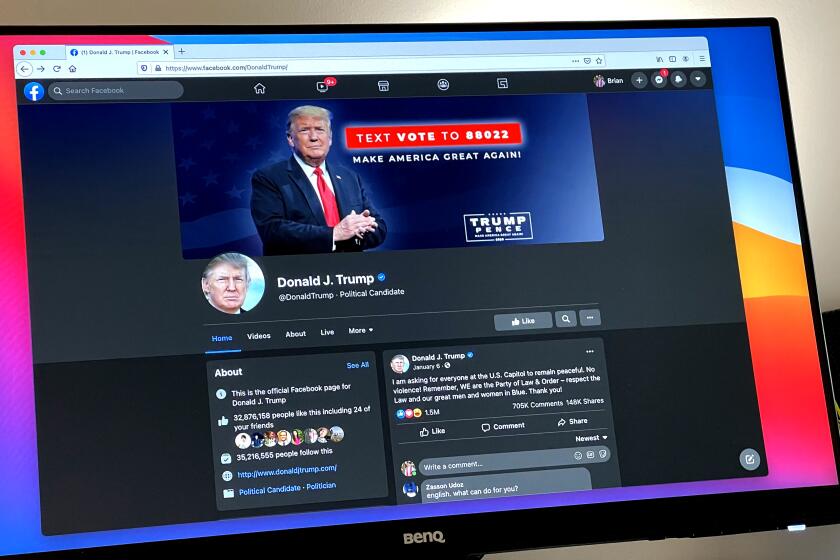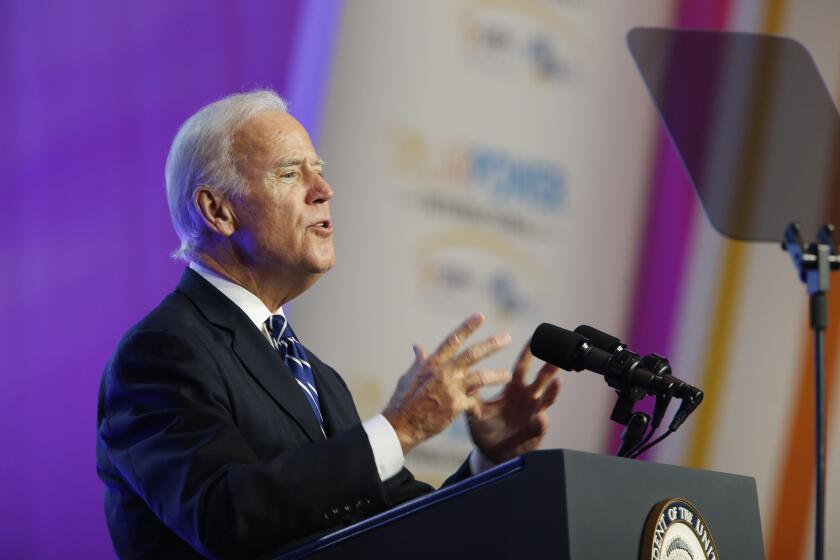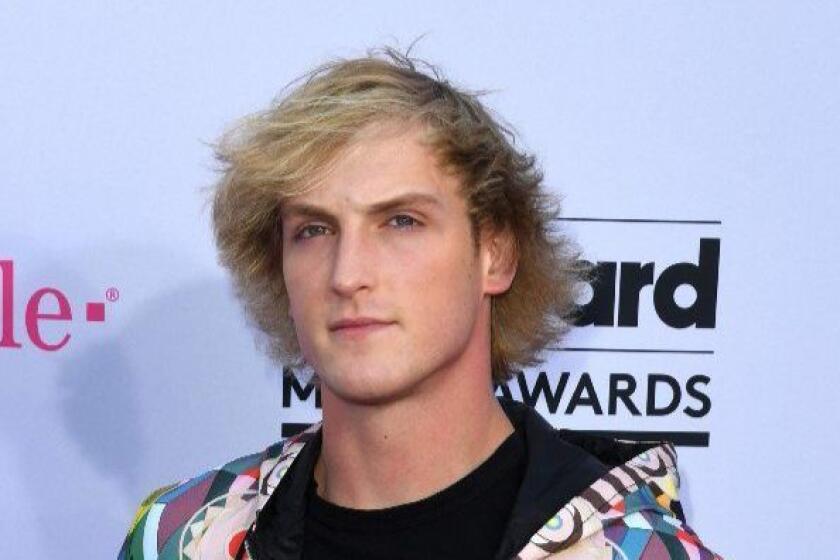
- Share via
Logan Paul hasn’t posted a new YouTube video in more than six months. His last two uploads were titled “I’m Fighting Floyd Mayweather This Week” and “My Last Words to Floyd Mayweather.” Then, silence. If you didn’t know better, you’d think he died in the ring.
What else but a fatal boxing incident, after all, could have led one of the most famous YouTubers in the world — a controversial but charismatic web presence who helped shape the template for modern e-celebrity — to leave his 23.2 million subscribers on radio silence for half a year and counting?
“Demonetization; being blacklisted; being shadow-banned,” says Paul, 26, rattling off the ways YouTube and other mainstream social networks have alienated him. “It’s really demotivating when you are yourself, and the platform that you’re on — because of the advertisers because of public sentiment, whatever it is — no longer wants to support you.”
In search of a corner of the internet where he can be his full, unfiltered self, Paul has traded in YouTube for Subify, the company that runs the back-end tech for his boutique fan network the Maverick Club. Part of Subify’s pitch is that there are almost no restrictions on what Paul can post in the Maverick Club, or what other celebrities can post through their own Subify-enabled channels.
“It really feels like free speech is dead in America right now because a platform can literally shut you down and take away your microphone,” co-founder Zak Folkman said. “At Subify, we will literally never do that to a creator unless they are promoting terrorist acts or child pornography.”
In an era when social media censorship is a top-of-mind concern for everyone including content creators and members of Congress, it’s a vision with appeal to some. But it’s also one that raises a lot of messy, ethically fraught questions — as a recent discussion between Paul, Folkman and Subify co-founder Chase Hero showed.
“If we had a Nazi on the platform that just wanted to talk about their beliefs,” Folkman said at one point during the Zoom call, “I personally would have a very hard time telling them, ‘You’re not allowed to do that,’ unless they’re inciting violence.”
This, apparently, was news to Paul.
“Look, I love your sentiment,” he said. “But as another creator on the platform, you’d be hearing from me.”
Frozen in time since the Jan. 6 insurrection, perhaps forever, Donald Trump’s Facebook page lives on as an internet destination for #MAGA fans and #Resistance types alike.
“The real answer is, I think that we just take everything as it comes,” Hero said. “All these people are gonna have different beliefs … and giving them a platform to communicate with their people is really all we care about. Right? And obviously, I’m kind of with [Paul]; I’d be really hard-pressed about someone who’s a Nazi.”
“Obviously we don’t support —,” Folkman said, before Paul cut him off, saying it was a terrible example.
Folkman continued: “We’ll take it on a case-by-case basis. But I really can’t see too many creators that we wouldn’t feel comfortable with supporting their right to freedom of speech.”
Paul didn’t seem convinced. “I will f— up a Nazi,” he said.
“Bad example,” Folkman said. “Bad example.”
After the call, the company told The Times that Folkman had misspoken. “We absolutely do not allow hate speech of any kind — for example no Nazis or anything of that nature,” an email statement attributed to Folkman read. “We take pride in giving a platform to creators of all kinds.… We believe that everyone is entitled to have their voice and opinions heard.”
If Subify’s leaders are conflicted about what running a haven for free speech actually entails, they’re not alone. The internet has long been seen as a refuge for untrammeled expression, but as large social media platforms have come to dominate the web, that ideal has run up against concerns about extremism, misinformation and user safety. What moderation steps tech platforms do take have become controversial and highly politicized.
A Biden presidency could have major ramifications on U.S. tech policy.
Subify isn’t the first tech company to build a brand around the promise of near-absolute free speech, but it does differ from many such apps in its focus on influencers’ creative freedom rather than Trump-era culture wars.
“The simple fact is that no company in its right mind would ever throw its hands up and cede control of its product solely to the users of that product,” said Sarah T. Roberts, an associate professor at UCLA and co-founder of its Center for Critical Internet Inquiry.
Because social media companies in America enjoy wide legal immunity to moderate what their users post, Roberts said, “this therefore becomes a question of tolerance from a business perspective. That’s why I consider content moderation to be primarily a tool of brand management for firms; the firms themselves have to assess what risk they’re willing to take by having distasteful, abhorrent material on their site.”
For Paul, these aren’t abstract questions. Back when he was primarily known as a YouTuber, that platform demonetized him — or took away his ability to make money from his videos — after he posted a series of controversial clips in which he tasered dead rats, endorsed the “Tide Pod challenge,” and, most notoriously, filmed a suicide victim in Japan’s Aokigahara forest.
Other scandals have found Paul saying he would “go gay” for a month; using women as a “human bicycle”; and, in one video, appearing to lasso unsuspecting women.
These days, Paul hasn’t entirely abandoned YouTube — his podcast Impaulsive has its own channel, with 3.53 million followers, that still updates regularly — but he has moved much of his creative output, including his signature autobiographical vlogs, over to Subify.
“You’re creating it for an ecosystem of people who really like you,” Paul said of the Maverick Club. “It’s not for the masses to judge or make assessments or make mean comments.… As someone who in the past has been polarizing, there’s people who don’t like me; there’s people who do like me. I really love the idea of leaning into people who do like me.”
An “Oops! All Logan Pauls” social network might sound hellish to those who find Paul’s patent mix of stunts and self-documentation obnoxious. But super-fans are willing to pay $19.95 a month for access, and Paul is happy to oblige them.
Behind the safety of a paywall, on a platform all his own, Paul said he’s able to post “a bit more explicit content; a bit more risque content.”
“It’s that 10% of me,” he said, “that whether for legal reasons, whether for public sentiment, whatever, I’m … unwilling to show the world.”
Subify declined to say how it would’ve handled the “suicide forest” and rat-tasering videos, instead pointing to “adult related content, conservative and other alternative viewpoints” and “hunting and firearms content” as areas where it’s more permissive than YouTube.
As Paul was growing disenchanted with mainstream social media, Subify offered him an out. Folkman and Hero, who have a background in e-commerce, had initially built a proto-Subify for personal use: “It was so that we could power our own brands,” Hero said.
But while hanging out with Paul one day — Hero and Paul’s manager are longtime friends — the YouTuber suggested they open it up more widely.
“He’s like, ‘Man, I think this would be really good for a person. What do ya think?’” Hero recalled. “I was like, ‘If you’re willing to be that person, we’d give it a shot.’”
The result was the Maverick Club, Subify’s first entry into celebrity fan platforms; it’s now been up and running for about a year and a half, Paul said. (Paul is one of Subify’s top creators, but according to a spokesperson, he has no other financial stake in the company.)
American blogger Logan Paul apologized Tuesday after getting slammed for a video he shared on YouTube that appeared to show a body hanging in a Japanese forest known as a suicide spot.
In the meantime, Subify expanded its suite of features and began finding new celebrities to work with: rapper Flo Rida, Jackass stuntman Steve-O, NASCAR driver Hailie Deegan. Hero said that “tens and tens of thousands of creators” have applied to join, and that he and Folkman are “constantly vetting, asking questions, and then doing our due diligence” to filter out poor fits.
Despite Subify’s promise of near-absolute free speech, not everyone makes the cut.
“There’s a guy who wanted to come in and revive the old bum fights, if you remember that … make homeless people fight,” Hero said. “We’re like, ‘Yeah, that’s just not gonna work here. I love you to death, but that’s just not something that we really condone.’”
The company’s laissez-faire attitude also doesn’t extend to its nonfamous subscriber base. Celebrities may get wide latitude to post things they couldn’t put up elsewhere, but in the interest of building an environment that the co-founders describe as a “safe space” and an “echo chamber” for content creators, their fans are subject to more rigorous scrutiny.
“We have moderators … so if we see anybody who’s being actively negative or anything like that, it’s actually a violation of the terms and conditions,” Folkman said. “We’ll usually send a warning if it’s pretty mild, and then from there, if they violate it again, they’ll be banned and blacklisted.”
Entry into that walled garden isn’t free. In exchange for building each client a stand-alone platform with support for multimedia posts, livestreaming, tipping, direct messaging, mobile apps and push notifications, the company — which a spokesperson said has been valued by third parties at approximately $100 million — takes a cut of everyone’s earnings. The specific percentage “depends on the individual platform size and functionality,” the spokesperson said.
As paywalls proliferate on the internet, it’s an increasingly popular business model. Startups such as Patreon, Substack, Cameo and Bandcamp now help influencers, artists and other online entrepreneurs mint a buck off of content they might otherwise put out for free. The company Fanfix offers monetization tools similar to Subify’s but — according to co-founder Simon Pompan — adheres to more traditional moderation policies, including not allowing nudity.
OnlyFans is another such competitor. Although it’s best known for selling amateur and independent pornography, the platform has feinted at ambitions of becoming a more generic content-monetization platform; this summer it briefly moved to ban sexual content, only to reverse course days later.
Subify allows pornography too, but its co-founders hope to avoid being pigeonholed as an overtly sexual platform.
“I’ve been recruited to OnlyFans,” Paul said. “The business model is great. But the platform has this stigma … I have no interest in being a part of.”
Subify has proved to be a suitable alternative. By combining OnlyFans’ monetization features, YouTube’s more flexible branding and a free-speech ethos all its own, the company has helped Paul build his own little internet oasis, free from the censors, haters and trolls who soured him on the open web.
“Subify has kidnapped me from YouTube!” he exclaimed at one point during the Zoom call.
“It’s been a great abduction,” Hero said.










